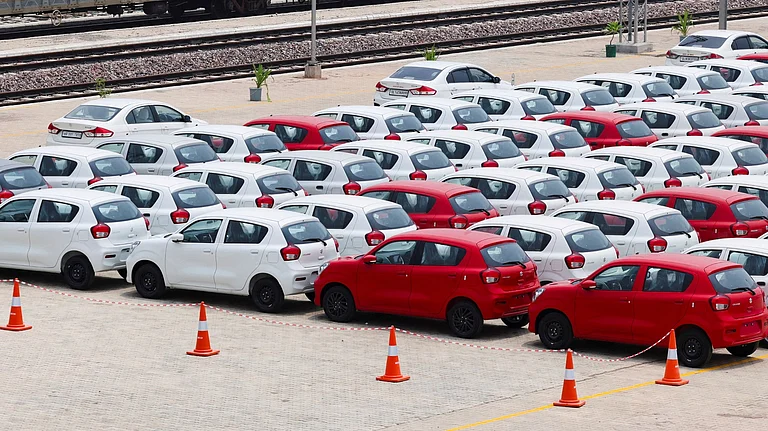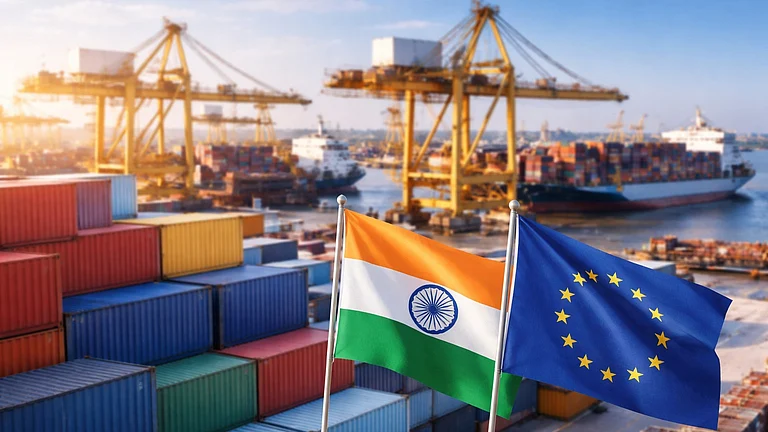India should not cut import duties for the automobile sector under free trade agreements (FTAs) with countries like the UK as it will adversely impact the sector and may result in closure of companies here, economic think tank GTRI said in a report on Wednesday.
The Global Trade Research Initiative (GTRI) said India has not given tariff or duty reductions for cars in its free trade agreements with ASEAN (Association of Southeast Asian Nations), Japan, and Korea.
"Do not cut auto (including electric vehicles) tariffs through FTAs. This will adversely impact auto majors who have invested billions of dollars in India and force them to wind up," it said.
It added that there is no reason to offer these concessions to the UK either, as the UK mostly assembles cars with parts imported from the EU (European Union), and China.
It said if India offers duty concessions to the UK, it might face pressure to do the same for other free trade agreement partners like Japan and Korea.
"This could lead some companies to reduce or even stop making cars in India and instead export them from their home countries. This will be rewarding imports over competing local production and lead to closure of many key units," GTRI Co-Founder Ajay Srivastava said.
India is negotiating a trade agreement with the UK, which is at an advanced stage of talks. The UK is seeking duty concessions on EVs.
He suggested that the government should support the industry through continuing the present tariff regime and additional PLI (production linked incentive) support.
It also recommended investing in R&D on the next generation of battery technology instead of subsidising EVs on road.
"The import intensity of EVs exceeds 70-90 per cent and most imports including batteries are from China. With over 70 per cent of power being generated from coal, EVs will not be green enough in India," it said.
Citing an example, it said that Australia, in 1987, produced 89 per cent of the cars it used. It protected the car industry through a high 45 per cent import duty. But the share of locally produced vehicles came down as Australia reduced import duties gradually.
"Today, Australia imports nearly all cars as tariffs came further down to a 5 per cent level. Most manufacturers in Australia shut shop," the report said.
"In contrast, India could attract significant investments in the car sector on account of high import duties. This resulted in the development of an indigenous car and auto component industry," it added.
Talking about the major challenges being faced by the auto sector, the report said that the industry is facing global supply chain issues that are driving up the costs of materials such as steel, aluminum, and rubber, coupled with a significant shortage of semiconductor chips.
Additionally, disruptions in Red Sea shipping routes and various geopolitical conflicts are delaying delivery, increasing costs.
"The sector is under pressure from increasingly strict regulatory compliances. These include stringent emission standards, and heightened safety regulations," Srivastava said.
He added that the industry relies significantly on imported components, especially for advanced technologies and specialized features.
This dependency makes the industry vulnerable to fluctuations in global supply chains and foreign exchange rates.
"In FY2022, the estimated value of imported automotive components and other inputs was USD 20 billion, with original equipment manufacturers (OEMs) and auto part suppliers contributing 60 per cent and 40 per cent respectively," the report said.
Around 70 per cent of these imports are in four categories - engines, drivetrains, electrical systems, and electronics.
As the value and importance of electronics in new cars increase, the reliance on imports is also expected to grow, it said adding China is the biggest source of imported auto components for India, accounting for nearly 25 per cent of total imports.
Japan, Germany, South Korea, and Thailand are other major import sources.
It also said that about 70 per cent of India's passenger cars are made by companies controlled by foreign firms.
India is the world's fourth largest car producer, after China, Japan, and the USA, making 4.6 million cars in 2023. In exports, India ranked at tenth position, with a share of 2.4 per cent.
It contributes 7.1 per cent to the country's GDP, up from 2.8 per cent in 1992-93. It also accounts for over 50 per cent of India's manufacturing GDP. It provides direct and indirect employment to over 19 million individuals.
The auto and auto component industry's turnover crossed USD 150 billion in 2022-23.
Exports were robust in automobiles at USD 8.7 billion, two-wheelers at USD 2.8 billion, and auto components at USD 7.3 billion, it said.
"Steps such as high import tariffs, including not cutting tariffs under the FTAs and allowing up to 100 per cent FDI through the automatic route have led to rapid growth of Indian automobile industry starting late 1980s," it said.
The basic import duty on large cars is 100 per cent of the import value of the car whereas duty on medium or small cars is 70 per cent. For old cars, the duty is 125 per cent.


























.jpg?w=200&auto=format%2Ccompress&fit=max)




